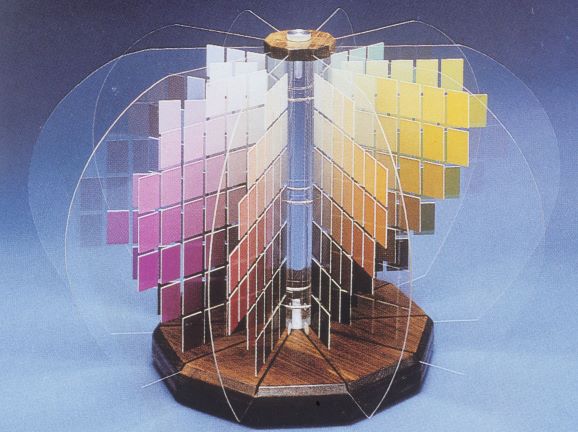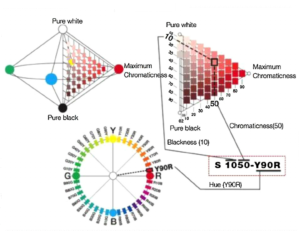

How does one describe colour?
Your perception and interpretation of colour is highly subjective and quite often differs from one person to person.
As a result it is difficult to communicate a particular colour to someone without some reference to an agreed standard. A recognised colour system within the UK was the introduction of BS 2660 Colours for building and decorative paints in 1955. This colour range consisted of 100 colours with cross reference to the Munsell range.
Prior to this manufactures had their own colour systems which linked to the British Standards and Munsell Tree colour notations.
Currently two colour systems are referred to enable colour to which enable colour to be interpret by using notations based on three properties. Hue, Value and Chroma. Hue denotes the basic colour, Value measures the lightness and darkness of the Hue, Chroma relates to the greyness of colour.
The Munsell tree illustrated operates on three principals. The circumference relates to the Hue which is a Colour Circle base on primary, secondary and tertiary colours. Value is the centre vertical pole of the tree which is divided into eleven divisions with white expressed as 10 and black 0.
Therefore the colour scale between the two is represented in the form of greys from light to dark. Chroma is measured on a horizontal scale from the grey tone outwards to the pure hue.
The Natural Colour System(NCS) operates in a similar way to the Munsell tree by taking Hue, Chroma, Value but in this instance separating the colour byway of a colour circle and triangle as illustrated below in favourites.
The Munsell colour tree was first introduced in 1905 by Albert Munsell and the colour offering was adopted by most manufactures as a cross reference to their own colour assortment. In 1955 British Standards introduced BS2660 Colours for Building and Decorative Paints which still had the cross reference to the Munsell system.
In 1986 BS 2660 was superseded by BS 4800 ( current standard 2011) which is taken from the British Standards 5252 Framework for Colour Co-ordination for Building Purposes.
In1997 The Scandinavian Colour Institute introduced the NCS range of over 1200 colours and was adopted by one of the UK larges paint company which lead to other manufactures producing their own colour section. It is for this reason that leading manufactures now offer an extensive colour of colours and with the use of a spectrophotometer it is possible for any dry colour sample can be matched and mixed at the point of sale.